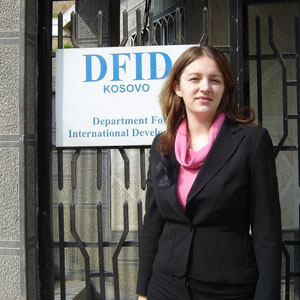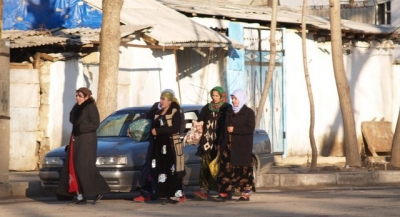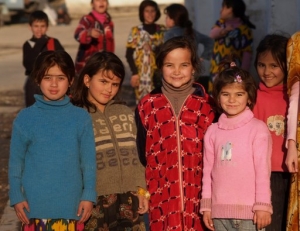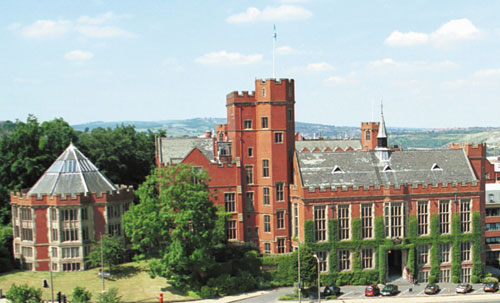Career interview: Government Statistician
How do you help a developing country get back on its feet? There's material aid of course, as well as political intervention; fair trade agreements and the like. But what may come as a surprise is that there's also statistics. For any country, measuring poverty, the growth of the economy, unemployment and other socio-economic factors are essential in deciding on and testing political policy.

Emily Poskett in Kosovo
Unfortunately many countries lack the means and expertise to collect data and analyse them rigorously. This is where nations like the UK can help. Emily Poskett works as a government statistician at the Department for International Development (DFID). Her job is to help Eastern European and Central Asian countries to conduct, analyse and interpret statistical data. And with its interesting mix of maths, politics, travel and the opportunity to make a difference, it's something of a dream job too.
When she started out with a maths degree in 1997, Emily had no idea of the interesting career that lay ahead of her. "I'm really amazed by people who at 18 know what they want to do. I had no idea what I wanted to do at all." She chose maths because she was good at it and because it came naturally to her, rather than because she had a specific career in mind. She didn't think her career adviser at school was very informative, telling her to pick the subjects she was best at and to carry on with those. "But actually that worked well for me," she says. "I was able to go to university and have a really good time, and still do quite well at a subject that I enjoyed doing.
"I did maths at the University of Sheffield, which is a great place to study. The course there was really flexible. You register initially for a four year MMath course, and then you have the option to finish at three years and have a BSc, or continue on to the fourth year." As Emily came to the end of the first three years, she was a little clearer about what she wanted to do and lot clearer about what she didn't want to do. "Most of my friends were going on to be maths teachers or accountants, neither of which appealed to me. I had done some work in accountancy offices over the holidays and it didn't really interest me. And I know I wouldn't be a good teacher. I did some work experience in an actuary's office, and I found that quite interesting, but I couldn't quite face all the years of study involved. And I wanted something that was a bit more varied, and that had scope to move in different directions."
Emily's personal tutor at university was an assessor for the Government Statistical Service (GSS) and advised her to look into this scheme. "As a government statistician you are recruited to a central point in the government, to the GSS, not to any government department. You have a lot of scope to move around in completely different jobs, and completely different topic areas in different departments. That really appealed to me. I didn't want to sign up for something and 40 years on be at the same desk." Emily had always enjoyed the hands-on statistics modules at university, so she decided to leave university after three years with a BSc and applied for a position with the GSS.
"I was taken on on what's called the Fast Stream. That means you only stay in any one post for between 12 and 18 months. Then you are expected to move on and do something different, until you've done around 4 or 5 posts and you are ready to be promoted to a permanent post."
Corridors of power

The UK Houses of Parliament
Emily's first placement was at the Cabinet Office, which sits under the Deputy Prime Minister, who at that point was John Prescott. Its purpose is to oil the wheels of government, helping it to function well. It supports the Prime Minister and the Cabinet in their tasks, and also ensures that the Civil Service works effectively.
Emily's placement was in the Civil Service division. "I was collecting and analysing information on the Civil Service itself; on pay, diversity and that sort of thing." Sometimes this was in response to questions posed by members of the public or of Parliament. "If you were to write a letter to an MP saying 'why aren't there more women in senior roles in the Civil Service?', your MP would have to get the relevant information and that would come from us."
At the time, the presence of ethnic minorities in the Civil Service was an important issue. Tony Blair himself showed a lot of interest in the kind of information Emily's department would deliver, and although she didn't get to meet Blair, her department's activities were quite high-profile. "It was a nice first job as it was quite straightforward and I got to have involvement in all stages of collecting information, analysing information, making publications, and responding to questions." But despite the high-profile questions, Emily's role turned out to be quite a routine job and she decided that she wanted to move on.
Helping countries help themselves
The GSS offers training courses and conferences for its employees and trainees and through them Emily found out about potential career paths. The Department for International Development soon attracted her attention. "I've always been interested in environmental and developmental issues. I hadn't heard of DFID before, but when I started to get to know the GSS, I learnt that it was working to reduce poverty and to improve standards in developing countries. It sounded like a really interesting place to work. I applied for a post through the internal application scheme, and I got it. I moved in 2002."
DFID is Britain's aid agency. Funded by UK taxpayers' money, its aims are encapsulated in the eight Millennium Development Goals that seek to reduce poverty, disease and hardship around the world. It's easy to state these goals, but of course achieving them is another matter entirely. "Aid is a very complex industry to be in. There's no wrong or right way of doing things, because if there was, then there wouldn't be any more poverty in the world! DFID and the UK government believe that the best way to reduce poverty is to enable governments in developing countries to be best-functioning, more responsive to their systems, more accountable, and in control of delivering their services.
"The UK provides aid to developing countries in a number of different ways including providing funding to the World Bank, UN, EC and other multilateral donors, providing humanitarian and other aid in the case of emergencies and so on. But our preferred way of working is providing funds for governments to spend in the way they want on their people, and helping that government to function in a way that allows them to do this effectively.
"There are various groups of specialists within the DFID. As statisticians we believe that developing countries need to have good evidence on which to develop good policies, to manage their own governments. So we support governments in poorer countries to collect and analyse data, and use it in policy making. This might include supporting a census or a survey, providing IT, and training government statisticians in their GSS or equivalent." DFID employs over 2500 people, around 30 of whom are statisticians.
Emily has been at DFID for three years now, having been promoted to a permanent job last year. Her role covers Eastern Europe and Central Asia, and she's responsible for twelve countries in all. "I manage projects in order to build capacity in statistics. We provide funding for a survey here, some training here, some computers here... a whole range of things. My role is to assess how best to use our money, to match the projects to the individual country's priorities. I design projects and often recruit consultants to implement them. Then I manage that project and go out to the country every year to make sure the money is being spent as it is meant to."

Women in Tajikistan.
The projects supported by DFID vary in nature depending on the current capacity of each government to collect and use data, the activities of other donors and the interests of the governments themselves. In Georgia, Kyrgyzstan and Moldova the Department is investing in the future of the household survey system. These are the core building blocks of social surveys that collect data on the labour market and household expenditure. The data feed into unemployment figures, household income figures and GDP figures. Emily's projects help the National Statistics Offices in these countries to plan these surveys, helps to train staff and interviewers, often bringing in experts from the UK or other developed countries, who support the project for a number of years.
There also are more ad hoc projects, with the DFID providing funding through other agencies. UNICEF, for example, have a survey called the Multiple Indicator Cluster Survey, which collects information on child and women's welfare, and the DFID has funded this survey in a number of countries. "It is important to coordinate with what other donors are doing," Emily says. "Ideally we would all work together to support the statistics system through one fund, but often there are existing projects and interests of different organisations to plan around. For example in the region I work in economic statistics are mainly supported by the International Monetary Fund and the World Bank, and the Food and Agricultural Organisation puts money into agricultural statistics. So DFID tends to support surveys that gather social information."

Children in Tajikistan.
Emily is what is called a sector expert in statistics. In the countries she covers there are small offices with three or four permanent DFID staff who meet with the government frequently, know about social and political issues and can identify how DFID can help. There also are other sector experts on things like health, water and education.
"When we come out and visit we'll be approached by the government saying which areas they would like funding for. I'll go and visit the statistics office and the relationship is built up over time. And as we get to know the statistics office and what its priorities are, we can make decisions as to whether their requests are reasonable. In other parts of the world, particularly in Asia and Africa, DFID will have a much bigger office placed within the country and the sector experts will also be based out in the country itself."
Damn lies
The reputation of statistics isn't exactly untainted, with many people feeling that they can be manipulated into saying whatever politicians want them to say. So has Emily experienced interference from politicians? "How people use the numbers is one thing. But in terms of producing the numbers we have a very strict code of practice, the National Statistics Protocols. This means that we are completely protected from interference.
"In the countries I work in, the former Soviet countries, there is more of that kind of pressure on statisticians. But in the UK, absolutely not. It's frustrating how much cynicism there often is in the public and in the media. The head of the Office for National Statistics, the national statistician Karen Dunnell, has a very clear responsibility. She has the power to protect us."
Personal perks
Emily is passionate about her job. The opportunity to travel is one of the obvious perks of the job. "I really love my job. I travel more than most, because I cover quite a lot of countries. Other people, who cover only two or three countries, actually live abroad. But I cover 12 countries, so I travel about a week a month. I travel to amazing places, to places I never thought I would get to go to."
But the nature of her work is equally important to Emily. "I get a sense of doing some good in the world. I'm not just out to make money for myself, or for anybody else. The DFID is a very passionate place to work, and I like working here. Most people here really believe in development and in what DFID's trying to achieve. We're all passionate about doing our best and working hard."
Are you tempted?
If you like statistics and would like a job that impacts on political and social issues, at home or abroad, then it's well worth looking at a career within the GSS. "I would definitely advise people to apply for the GSS. It's a really good scheme, you get the opportunity to move around and work in different areas. I'd advise people to study what they're interested in and keep their eyes open and keep up to date with current affairs, and attend topical lectures if they are interested. But I myself didn't set out to come here. I was just enthusiastic about what I was applying for and I was interested in learning more."

Statistics form the basis of policy making. The Government constantly releases crime figures, figures on school league tables and figures on NHS waiting lists. All those are produced by Emily's peers in government departments and there are a variety of roles for statisticians.
"My job is quite unusual. Other people work in government departments like the Office for National Statistics (ONS), the Home Office, or the Department for Education and Skills, collecting data, producing numbers, engaging in surveys, censuses and national accounts. In my grade in those departments I would be managing a team of people, oversee data publication, manage data collection and stand up in front of the press saying 'these are the figures and this is what they mean'."

Emily on safari in Tanzania.
Working for the Civil Service offers reasonable pay, lots of holiday and good benefits, as well as lots of opportunities for professional development. At the moment Emily is doing a Masters in statistics. "It's an option you can do as part of the GSS, though you don't have to. It is a really well-designed masters, run at Southampton University jointly with ONS. It's designed for people working in the GSS. You do four weeks a year at university and it takes five years to complete. It's very practical and enables you to learn about other areas of the GSS that you've not worked in. This is really helpful for me as I need to know a bit about everything."
With all these options, Emily is extremely positive about her future. "I can stay in DFID now for 40 years and work in hundreds of different interesting countries. Or I could move around the GSS, to the ONS, the Department for Education and Skills, or the Home Office. But I really enjoy working at DFID and would like to go overseas with them. I have statistical colleagues who live in South Africa, Uganda, Tanzania — Africa is where I would like to go next."
Further information
- Fast Stream — the graduate entry programme for joining the Civil Service
- The GSS recruitment website
- Vacancies at the Office for National Statistics
- DFID — the Department for International Development
About the authors
Rachel Thomas and Marianne Freiberger are the editors of Plus.
